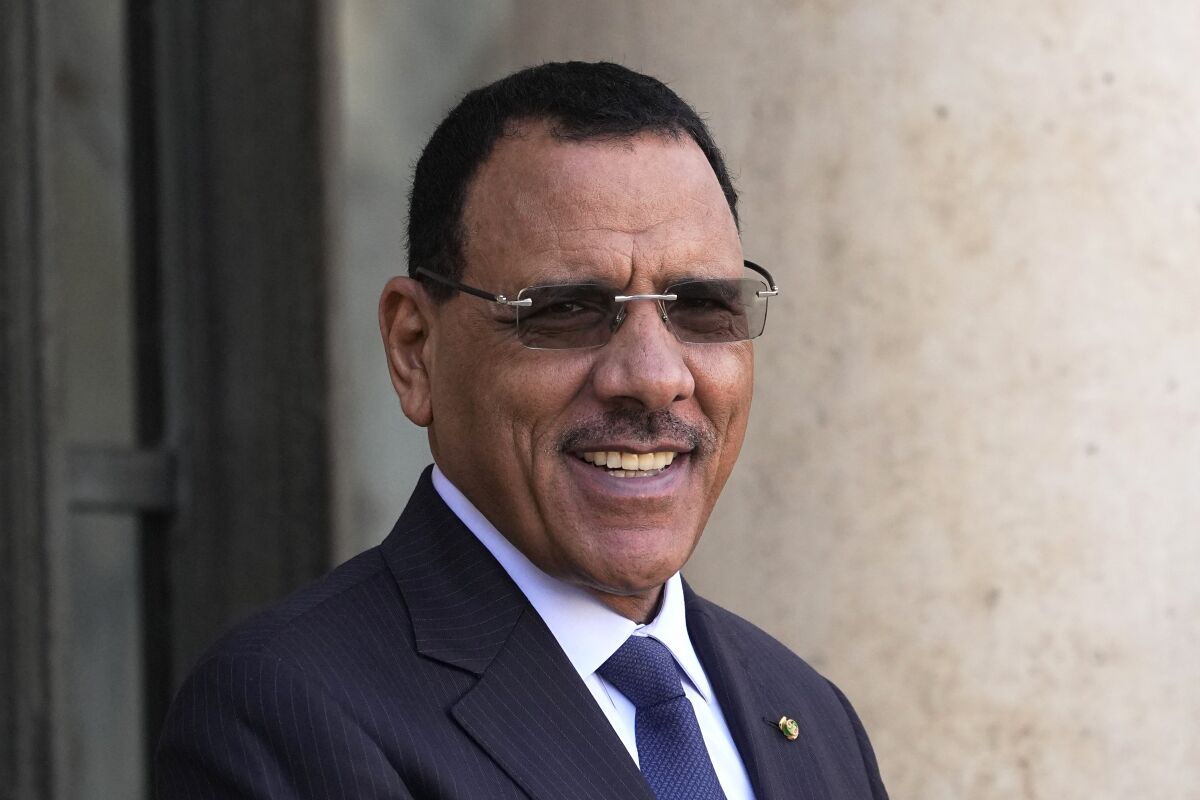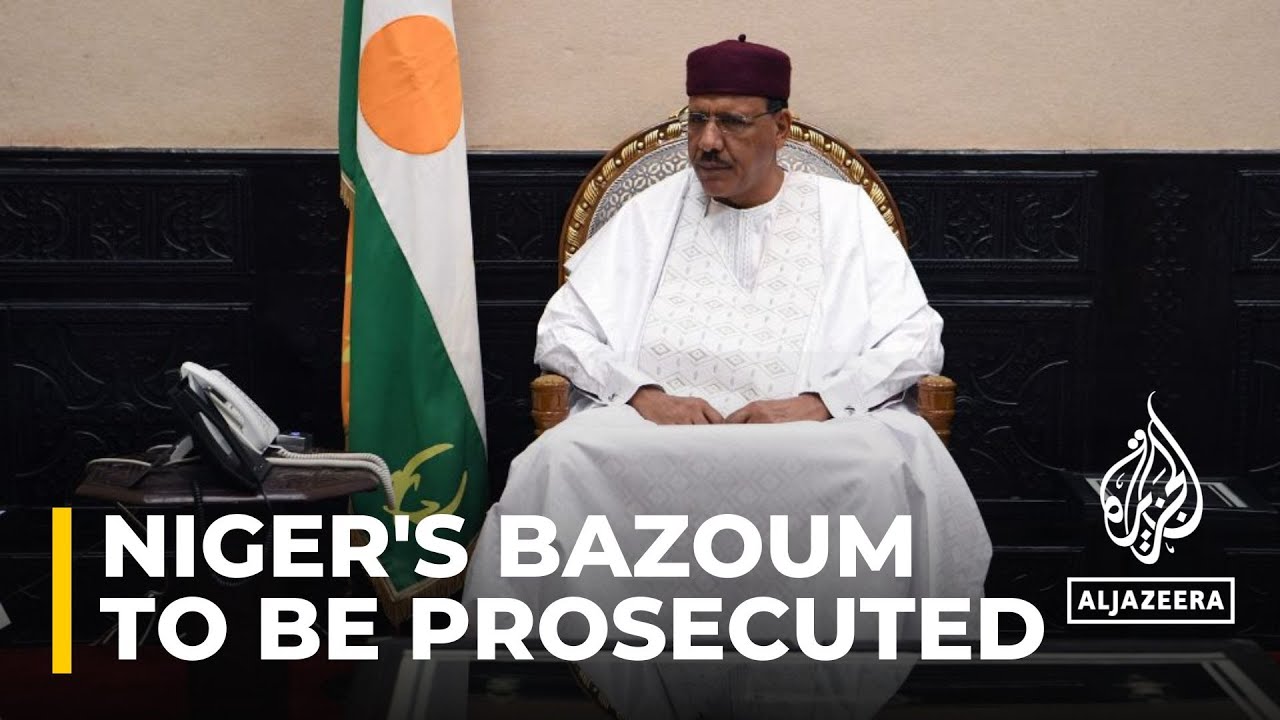Niger's Coup Leaders Set To Prosecute Deposed President Bazoum For Treason Charges
Niger's coup leaders set to prosecute deposed President Bazoum for treason charges. The military junta that took control of Niger has stunned the world with its announcement to prosecute ousted President Mohamed Bazoum on charges of "high treason" and undermining state security.
Author:Dexter CookeReviewer:Hajra ShannonAug 15, 202312.9K Shares446K Views

Niger's coup leaders set to prosecute deposed President Bazoum for treason charges. The military junta that took control of Niger has stunned the world with its announcement to prosecute ousted President Mohamed Bazoum on charges of "high treason" and undermining state security.
This dramatic development unfolded shortly after the junta expressed openness to dialogue with West African nations to address the escalating regional crisis.
The situation is fluid, with potential consequences that could reshape the nation's political landscape and regional stability.

Niger's Mohamed Bazoum faces 'high treason' charges: Reports
The Gravity Of The Charges
The stakes are high for Bazoum, as Niger's penal code stipulates that if convicted, he could face the death penalty.
The junta's spokesperson, Col. Maj. Amadou Abdramane, revealed on state television that they had compiled sufficient evidence to prosecute the deposed president and his alleged accomplices, both local and foreign.
The charges stem from Bazoum's post-coup interactions with prominent West African politicians and their "international mentors," a group accused by the junta of orchestrating a campaign to disrupt a peaceful transition and provide justification for military intervention.
A Tumultuous Transition
The political turmoil in Niger is further complicated by the intricate web of alliances and rivalries that permeate the region.
The junta's ascendancy over a West African regional bloc considering military force demonstrates the junta's strategic prowess.
The tussle between the junta and regional actors has implications for the stability of not just Niger, but the broader Sahel region.
Public sentiment in Niger is far from unanimous. While some citizens are convinced of Bazoum's guilt, citing alleged embezzlement of the nation's resources, others stand by him.
The charges of high treason and their potential consequences cast a shadow over Bazoum's legacy, prompting intense debates across the nation about his role in the unfolding crisis.
ECOWAS And Regional Dynamics
Niger, historically a key partner for Western nations in combating the growing jihadi insurgency linked to al-Qaida and the Islamic State group in Africa's Sahel region, finds itself on uncertain diplomatic ground.
The international community's response, coupled with the junta's actions, could reshape Niger's geopolitical dynamics and influence the effectiveness of counter-terrorism efforts in the Sahel.
The Economic Community of West African States (ECOWAS) has taken a strong stance against the junta's actions, condemning the treason charges against Bazoum as provocative and contradictory to any claimed willingness to restore constitutional order peacefully.
The deployment of a "standby" force by ECOWAS highlights the severity of the situation. The crisis now hinges on the junta's willingness to negotiate, the regional bloc's decision-making, and the potential intervention by the African Union Peace and Security Council.
“„Let’s see what these negotiations actually look like, because it’s also in the junta’s benefit to, in the least, entertain talks. That doesn’t mean they’ll be serious about them.- Aneliese Bernard, a former U.S. State Department official and director of Strategic Stabilization Advisors, a risk advisory group
Uncertain Future For Niger
As Niger's political landscape remains in flux, uncertainties persist. The junta's internal power struggles and the delicate dance with regional and international actors create a tense environment for citizens and outsiders alike.
The fate of former jihadi fighters, the ongoing jihadi violence, and the risk of instability further compound the challenges faced by the junta.
The path forward for Niger is riddled with complexities and competing interests. The junta's plans for Bazoum's prosecution and the international community's response will shape the nation's trajectory.
The fate of Niger hinges on whether regional negotiations succeed, the junta's commitment to stability, and the delicate balance between political transitions and security imperatives in a turbulent Sahel region.
Final Words
As Niger navigates through the storm of political upheaval, the impending trial of deposed President Mohamed Bazoum on charges of high treason hangs heavy over the nation.
Amidst regional tensions and uncertain diplomatic dynamics, the outcome holds the potential to reshape not only Niger's domestic landscape but also its role in the broader Sahel region.
The juxtaposition of power struggles, counter-terrorism efforts, and the push for stability adds layers of complexity to an already intricate situation.
As the world watches, Niger's destiny remains inextricably tied to its ability to balance internal demands with regional expectations, ultimately determining its trajectory in these tumultuous times.

Dexter Cooke
Author
Dexter Cooke is an economist, marketing strategist, and orthopedic surgeon with over 20 years of experience crafting compelling narratives that resonate worldwide.
He holds a Journalism degree from Columbia University, an Economics background from Yale University, and a medical degree with a postdoctoral fellowship in orthopedic medicine from the Medical University of South Carolina.
Dexter’s insights into media, economics, and marketing shine through his prolific contributions to respected publications and advisory roles for influential organizations.
As an orthopedic surgeon specializing in minimally invasive knee replacement surgery and laparoscopic procedures, Dexter prioritizes patient care above all.
Outside his professional pursuits, Dexter enjoys collecting vintage watches, studying ancient civilizations, learning about astronomy, and participating in charity runs.

Hajra Shannon
Reviewer
Hajra Shannona is a highly experienced journalist with over 9 years of expertise in news writing, investigative reporting, and political analysis.
She holds a Bachelor's degree in Journalism from Columbia University and has contributed to reputable publications focusing on global affairs, human rights, and environmental sustainability.
Hajra's authoritative voice and trustworthy reporting reflect her commitment to delivering insightful news content.
Beyond journalism, she enjoys exploring new cultures through travel and pursuing outdoor photography
Latest Articles
Popular Articles